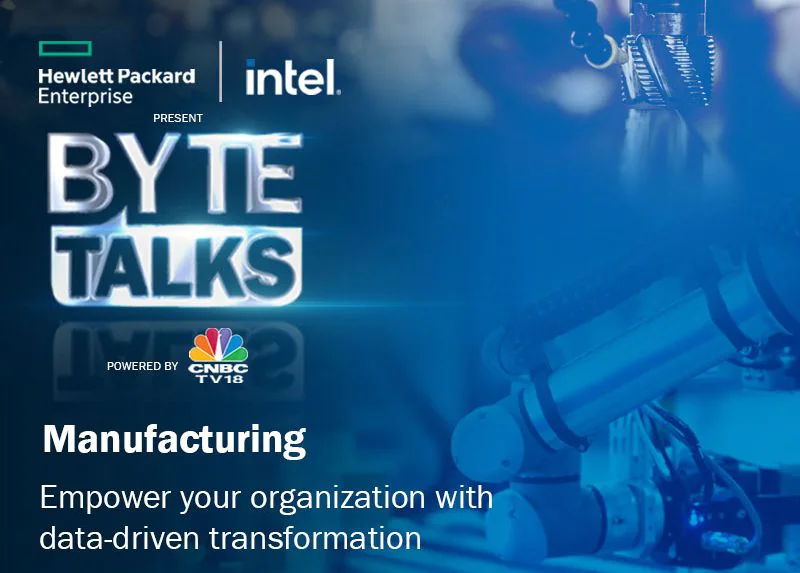Overcoming Manufacturing Sector Challenges With Technology Solutions
Over the past decade, India’s manufacturing sector has rapidly adopted cloud solutions and other technology. While this has delivered unprecedented gains, understanding the importance of an agile, data centric strategy, in the context of the multi-cloud environment, has become extremely important to optimise outcomes.
The second episode of ‘Byte Talks’, a campaign by Hewlett Packard Enterprise (HPE) and Intel, powered by CNBC-TV18, featured a clique of sector stalwarts discussing the power of data driven transformations and challenges along the way.
Moderated by CNBC-TV18’s Reema Tendulkar, the power packed panel comprising Narendra Saini, CDO, Lupin; Gopinath Jayaraj , CIO, Tata Motors; Rajesh Uppal, CIO & MEB – Human Resource, Information Technology, Digital Enterprise, Education & Training, and Safety, Maruti Suzuki; Rajesh Dhar – Sr. Director, Infrastructure Hardware Growth, HPE and Baskar Dhandapani – Director, ODM & IOT Sales India, Intel.
Before diving into solutions that make data transformations seamless and effective, the discussion kicked off with the participants sharing their insights on the challenges that manufacturing companies face, across the board.
Baskar Dhandapani highlighted four areas that could pose as challenges - employee safety, roadblocks to manufacturing output growth, sub-optimal downtime of equipment and inventory and logistical bottlenecks. With practical illustrations he described how technology hardware and software has been helpful in overcoming these challenges, pointing out, “With the manufacturing sector in India gearing up to Industry 4.0, technology based solutions are no longer a good option but rather a critical component of the solution.”
Representing a manufacturing company with diverse and complex operations spread across the world, Gopinath Jayaraj said, “Typically, traditional manufacturing companies face the challenge of splicing together equipment and IT of various vintages.” He suggested that technology is required to bring everything together and correlate data, putting it in context so that operations technology and information technology are in sync. Connectivity to the cloud and leveraging of cloud technologies, storage, analytics, etc. has also become crucial to address challenges and achieve set objectives.
Rajesh Uppal shared his approach to digital transformation saying, “Organisations must have the right architecture in place to manage the data.” He emphasised that this architecture must be secure enough to ensure that the framework is sustainable and simultaneously, it must support analytics and the agility to deliver value even as the ecosystem evolves.
Agreeing, Rajesh Dhar commented, “Manufacturing organisations often face the challenge of data disarray. Data remains spread in silos across a sprawl of multi-generational IT. While such data contains value, it is trapped in legacy systems.” Another hassle he observed was the migration and movement of data securely in the multi-cloud environment.
Having worked with a lot of manufacturing customers in India, he presented a holistic solution to the entire data driven transformation, saying, “Our intelligent data platform consists of a few technologies which work together for data storage, data analytics and AI capabilities, data protection and it offers a world class HP green lake service. So effectively, we have solutions to manage our customers’ challenges of managing data for seamless insights for their business.”
Narendra Saini recounted how the manufacturing industry has seen a lot of process automation and optimization, using complex optimization engines which helped to build manufacturing twins. “All manufacturing industries face similar challenges along the value chain and since we have realised benefits from technology adoption, we have built our own digital transformation road map on which we are working right now. It’s a three to five year journey which is linked to business outcomes and benefits.”
The panel went on to discuss how a strong digital foundation could support AI and ML, which helps overcome bottlenecks and enhances business, while facilitating predictions that enable organisations react faster and more suitably to the uncertain world of today.
The participants also dissected the key factors that determine the speed and success of digital transformation and shared lessons from their own companies’ implementation of data architecture. They emphasised the need for digital literacy programs and touched upon how companies can ensure that data remains secure and compliant, while outlining the importance of data governance programs and data platforms.
It emerged that taking a holistic approach to digital transformation could equip manufacturers with solutions to challenges. Setting tangible end results and using the right technology to achieve them can unlock immense value and deliver speed and other efficiencies too.
Watch the full episode here https://www.youtube.com/watch?v=Jv0a-wopzgQ
This is a Partnered Post








Gloss